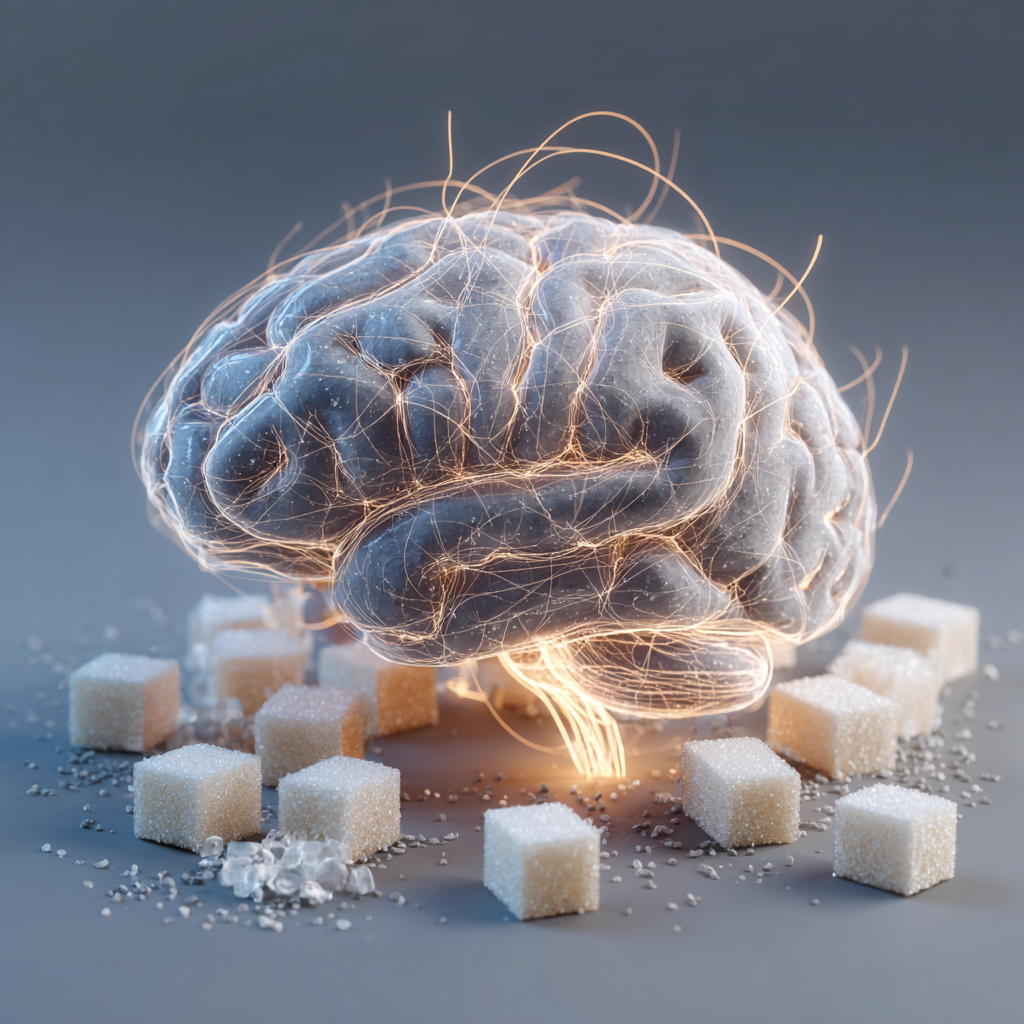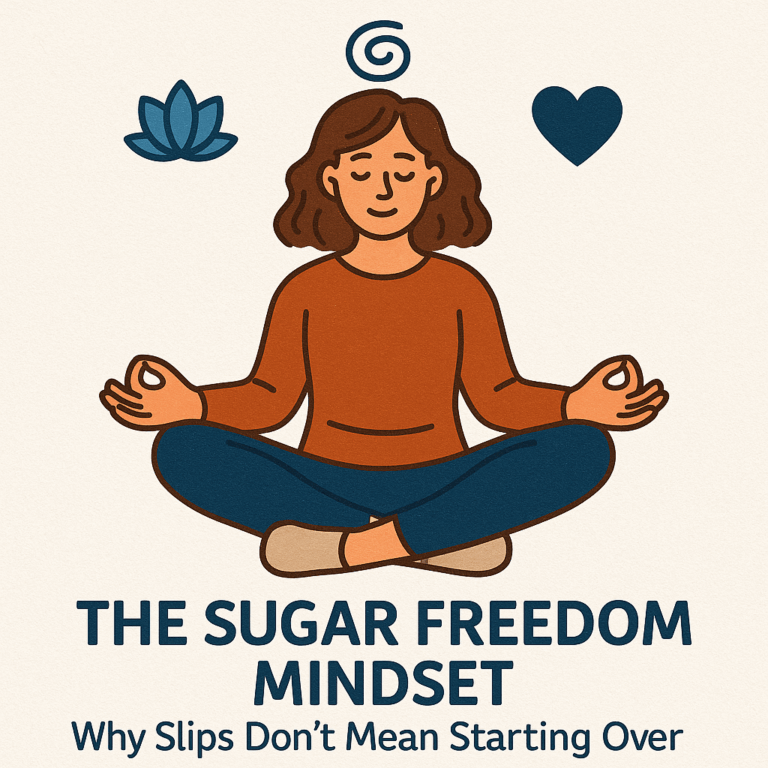By Mike, The SugarFreeMan
Founder of SugarDetox.com and the 30-Day Sugar Freedom Challenge

The Question I Hear Every Week
When I tell people what I do for a living, the responses are usually the same mix.
“Oh, I’m a sugar addict for sure.”
“Where are the cupcakes?”
“You have to talk to my wife.”
And, the one that always lands hardest:
“Is that a real thing?”
That question used to make me laugh. Now it makes me pause.
Because if you’ve ever tried to quit sugar – really quit – you already know the truth. The headaches, mood swings, and powerful cravings aren’t jokes. They’re withdrawal symptoms.
So let’s talk about what’s actually real – both in science and in lived experience.
This article was review by Dr. Camela McGrath, MD, FACOG. Find more about her here
What Science Says (and Doesn’t Yet Say)
According to the Diagnostic and Statistical Manual of Mental Disorders, Fifth Edition (DSM-5), sugar addiction isn’t officially recognized as a disorder – at least not yet.
The DSM is the global rulebook for psychiatric diagnoses. To get listed, a condition must have a mountain of peer-reviewed studies behind it. Gambling disorder made the cut. Sex addiction didn’t. Binge Eating Disorder did – and many researchers believe that binge eating is often a form of sugar addiction in disguise.
So why isn’t sugar addiction there yet?
Because the science is still catching up to what millions already know from experience.
Recent studies from Harvard and the NIH show that refined sugar lights up the brain’s reward center – the same dopamine pathways activated by drugs like cocaine and alcohol. Remove that stimulus suddenly, and the brain rebels.
Harvard Health Publishing calls it “a real biological process that drives repeated craving.”

What That Means for You
- You’re not imagining the struggle.
- You’re not weak or lacking willpower.
- You’re experiencing a chemical withdrawal that takes time and structure to heal.
Why Waiting for an Official Diagnosis Won’t Help
It could take years before sugar addiction becomes a formal medical category. Most of us don’t have that kind of time. Our blood sugar, weight, mood, and self-esteem are taking hits now.
I’ve seen this again and again with our community at SugarDetox.com. The people who heal fastest aren’t waiting for doctors or drug companies to name their condition. They’re the pioneers – the early adopters who trust what their bodies are telling them.
If you’re one of those people, I’ll tell you what I tell my clients:
You don’t need permission to get well.
“You don’t need a diagnosis to begin healing. You just need a decision.”
So Yes, Sugar Addiction Is Real – and You Can Recover
If you’ve tried to quit sugar and failed – maybe multiple times – you already have all the proof you need. You’ve lived the cycle.
- Craving something sweet after every meal
- Promising “just one bite” and losing control
- Waking up groggy, guilty, and more addicted than before
I’ve been there too.
Thirty-five years ago, my blood sugar was 247 mg/dL and my HbA1c was over 11%. I was on the edge of diabetes. Quitting sugar saved my life.
And I’ve seen tens of thousands of people do the same – not through willpower, but through recovery.
That’s why I created the 30-Day Sugar Detox Challenge – a guided path that walks you through every step of detox and recovery with support, structure, and accountability.
You don’t have to guess anymore.
The Time Gap (and the Truth We Live In)
Here’s how I see it:
There’s a time gap between what’s medically accepted and what’s happening in real life.
Science takes decades to validate what many people are already experiencing.
While the system debates terminology, millions of us are living through a global health crisis driven by sugar and ultra-processed foods – obesity, prediabetes, Type 2 diabetes, heart disease, fatty liver, and depression.
But you and I don’t live in research labs.
We live in the real world, where decisions made today determine how we feel tomorrow.
So let’s work with what we know right now:
- Sugar hijacks the brain’s reward system.
- It keeps insulin elevated and fat storage turned on.
- It spikes and crashes your mood, your focus, and your motivation.
- Removing it brings peace, balance, and clarity.
You don’t have to wait for a new DSM edition to tell you that’s worth pursuing.
How to Know If You’re Addicted to Sugar
You don’t need a medical test to see it. Just ask yourself:
- Do you hide sweets or eat them secretly?
- Do you eat even when you’re not hungry?
- Do you tell yourself “I deserve it” and then feel guilt after?
- Do you feel anxious or irritable when you try to cut back?
- Have you promised “never again” – and found yourself back in the pantry?
If you answered “yes” to several of those, you already know.The next step isn’t shame – it’s structure and support.
What Real Recovery Looks Like
When people hear “detox,” they imagine deprivation or punishment. That’s not what this is about. A sugar detox is about healing.
Healing your body’s chemistry.
Healing your relationship with food.
Healing the stories you tell yourself about failure.
Here’s what happens in the first 30 days:
- Days 1–3: The body begins to withdraw. Cravings peak. Mood swings hit.
- Days 4–10: Energy stabilizes. Sleep improves. Brain fog lifts.
- Days 11–30: Cravings fade. You begin to feel calm – like yourself again.

That’s recovery.
And that’s what we walk people through, step by step, in the 30-Day Sugar Detox Challenge.
Final Thoughts
Yes – in every way that matters, sugar addiction is real.
Science is finally catching up, but you don’t need to wait for the headlines.
If you’ve tried to quit sugar and struggled, you’re not broken.
You’re chemically dependent on a substance that’s been normalized.
The good news? You can recover – and you can start today.
About the Author
Mike Collins, known as “The SugarFreeMan,” has been sugar-free for over 35 years and is the founder of SugarDetox.com. He has helped tens of thousands of people break free from sugar addiction through his evidence-based approach combining nutritional science with practical behavior change strategies.
Medical Disclaimer
This article is for educational purposes only and is not intended to replace professional medical advice. Always consult with a healthcare provider before making significant dietary changes, especially if you have underlying health conditions.
FAQs
1. Is sugar addiction officially recognized by doctors?
Not yet. The DSM-5 doesn’t list sugar addiction as a disorder, but growing evidence shows that sugar triggers the same brain reward pathways as drugs and alcohol.
2. What are the signs of sugar addiction?
Common signs include daily cravings, irritability when cutting back, binge eating sweets, and hiding or sneaking sugary foods.
3. How long does it take to detox from sugar?
Most people experience withdrawal for 3-10 days. Within 30 days, cravings decrease dramatically as blood sugar and dopamine balance normalize.
4. Can you recover from sugar addiction without quitting completely?
Some can moderate, but true recovery usually requires removing refined sugars entirely for a period of time to reset the brain’s reward system.
5. Why do I crave sugar when I’m stressed or tired?
Stress and fatigue deplete dopamine and cortisol balance, making your brain crave quick energy. Sugar provides a temporary fix – and a long-term crash.
6. What’s the best first step to quit sugar?
Start by identifying hidden sugars in foods and drinks. Then build structure – like the 30-Day Sugar Detox Challenge – to replace chaos with clarity.





